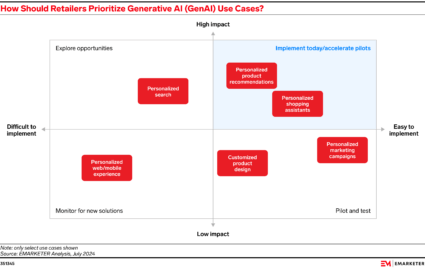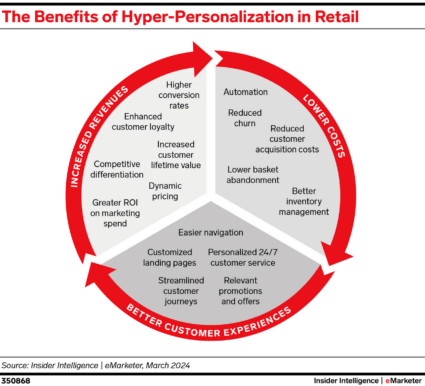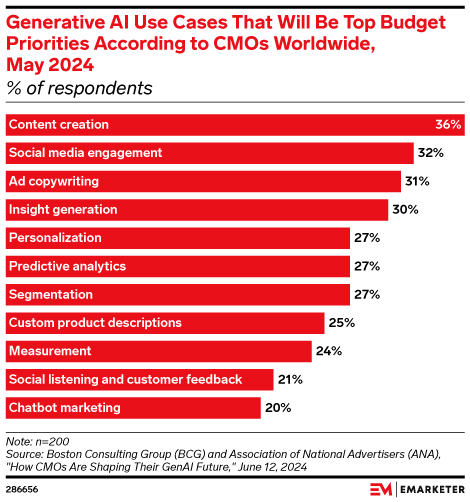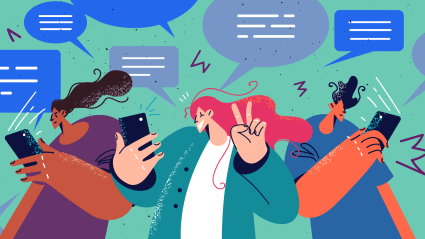We reached out to marketing leaders from across the industry to find out what their biggest predictions were for 2025, and they resoundingly agreed on one thing: AI will shake up everything next year.
From search to customer service to internal processes, AI is cropping up just about everywhere you could imagine. In fact, Jan-Willem Driessen, Chief Marketing and Technology Officer at ManCrates, predicted that we will see “increased use of AI in all aspects of marketing.” The brands that figure out how to leverage these new technologies effectively will rise to the top–and those that drag their feet risk being left in the dust.
Many of the leaders pointed to two specific areas where AI will have the most impact on marketing in 2025: personalization and efficiency. But some also included a warning about the challenges facing marketers as AI usage ramps up.
AI-powered hyper-personalization will be a gamechanger in 2025
Using AI tools doesn’t guarantee success–brands need to leverage AI the right way to provide the engaging, unique experiences customers have come to expect. In 2025, marketing leaders are pointing to AI-powered personalization as the biggest opportunity, from dynamic content that adjusts to consumer needs to direct relationships with customers.
“As the landscape becomes more expensive and crowded, brands must break through the noise by creating personalized, meaningful interactions that truly resonate.”
Retailers said that AI-powered personalized product recommendations and personalized shopping assistants had a high impact on their businesses, according to eMarketer. Christina Thelin, Chief Marketing Officer at CarParts.com, predicts that brands will soon be “leveraging AI to connect with customers 1:1 at scale.”

Source: eMarketer
Customers expect seamless purchasing processes supplemented by tech, including AI offerings like summaries of customer reviews and personalized recommendations. Matthew Pantoja, Chief Brand Officer at Alpha Industries, notes that “we’re at a point where consumers expect tailored content—not just the right product at the right time but also an approach that feels authentic and aligns with their personal journey.”
“AI is no longer just an analytical tool; it’s becoming a creative partner, making it possible to serve hyper-relevant messages, products, and experiences in real time.”
Hyper-personalization is the way of the future. And the only way to scale it is through AI.
Roberto Gennaro, Chief Digital and Innovation Officer at redtag.ca, sees a major shift coming in how brands connect with customers thanks to the deeper integration of AI tools: “As platforms like ChatGPT, Perplexity, and Gemini gain traction, we’re going to see personalized marketing evolve to new levels where interactions feel more intuitive and tailored. The ability to engage with consumers in real time through these AI tools will redefine the standard for customer experience, making marketing more precise, responsive, and impactful.”
The stakes for brands are high. Andy Beohar, Managing Partner at SevenAtoms Marketing Inc., notes that “the bar for personalization will be higher than ever” in 2025. “The greatest impact will be on hyper-personalized customer journeys at every marketing touchpoint.”
Traditionally, marketers used simple customer data like purchase history, customer name, age, and more to personalize user experiences. Hyper-personalization takes that a step further by leveraging AI and real-time data to provide up-to-date individual experiences.

Source: eMarketer
But personalization can be a balancing act; for many customers, there’s a fine line between useful and creepy. Two-thirds of consumers surveyed by Boston Consulting Group said they’d had at least one negative personalized experience that had caused them to end an interaction with a brand.
As much as you want to appeal to your audience, you need to stay true to your brand and not step over the line–while using AI to boost your creativity and efficiency.
Pantoja says, “Personalization can’t dilute brand values or make the consumer feel like they’re just another data point. AI’s real advantage will come from elevating human creativity, not replacing it. Marketers who understand this balance, respecting both data-driven insights and cultural nuance, will lead the charge in building genuine connections with their audiences.”
Increasing efficiency with AI tools will be a key differentiator
AI tools are only as good as the team wielding them. Luckily, AI can also help marketers work better within their companies.
Operational efficiency will be a major differentiator; brands that can streamline internal processes will swim, while brands that flounder will sink.
“2025 will demand AI solutions that do double duty: simplifying workflows while driving better outcomes. It’s time to make AI work smarter.”
Taylor Mahoney, Vice President of Solutions Consulting at Persado, says that while “2024 showed us a glimpse of GenAI’s revenue-boosting potential…2025 is all about taking AI to the next level. The focus will shift to smarter collaboration between teams and tech, optimizing performance and cutting inefficiencies.”
Other top marketers also noted that efficiency will be extra important next year. Sara Abitbol, Vice President of Marketing at Jaanuu, says that next year will be all about “optimizing efficiencies to meet growth and sales goals,” and Nicole Vinson, Vice President of Global Digital, Media, and Omni-Shopper Experience at Kellanova, said that “operational efficiency gained by AI and Gen AI” is essential.
Pantoja also noted that “AI will streamline our internal processes and sharpen efficiencies, allowing teams to focus more on innovation and brand storytelling.”
Some leaders went further, predicting that marketers will augment their abilities through specialized AI agents that will help them succeed in their roles and as a team.
“This will be the year of agents and automation, across all industries, FINALLY delivering on the integration of data, AI, and personalization that will upend all the goals and KPIs that marketers are typically looking at.”
Wpromote’s own Chief Marketing Officer, Megan McDonagh, believes that soon “all marketing jobs will have a personal AI Agent that will work alongside them, bringing a new level of intelligence and efficiency to help marketers work smarter and grow impact.”

Source: eMarketer
Mitigating risk and adapting to changes will be critical
As exciting as these new tools are, they still come with some risk. Marketers will need to use them judiciously and keep them accountable to the bottom line. Mahoney notes that “brands juggling multiple AI tools and decision engines will need to unify their systems, eliminating redundancies to build (towards) a single source of truth.”
She also says that “for marketers facing tighter budgets, 2025 will demand AI solutions that do double duty: simplifying workflows while driving better outcomes. It’s time to make AI work smarter.”
“The bottom line” for Mahoney is that “AI investments must deliver real results—think higher revenue, stronger customer connections, and streamlined operations.” You can’t lose sight of your business or your team as you look to new technology. After all, without a human touch, it’s hard to truly connect with your customers (who are, of course, humans).
To Pantoja, “the real power will be in the hands of brands that use AI thoughtfully to engage with consumers as individuals rather than segments.”
There are also other factors to take into consideration. Marketers are facing a tumultuous landscape: economic stress, political tensions, and a fast-changing industry can mean a tough climate for brands.
It will be essential to stay ahead of the game to win. Claire Perez, Vice President of Performance at Thrive Causemetics, said that “predicting performance in order to balance growth and profitability” will be important since “post-pandemic, and with the economic uncertainty, seasonal fluctuations don’t behave in the same way, so it becomes increasingly tricky to know when and how to place your big bets or major investments.”
“A cautious approach can become a self-fulfilling prophecy.”
Brands need to stay on the cutting edge and keep trying new things, including leveraging tech like AI, unique intelligence, and predictive tools. At the end of the day, these are all still in service of the oldest trick of the marketing trade: making connections–and sales–by reaching your audience in the right places at the right time.
As Thelin says, “the future of marketing lies in using technology to build authentic relationships that feel human, not transactional.”







Responses